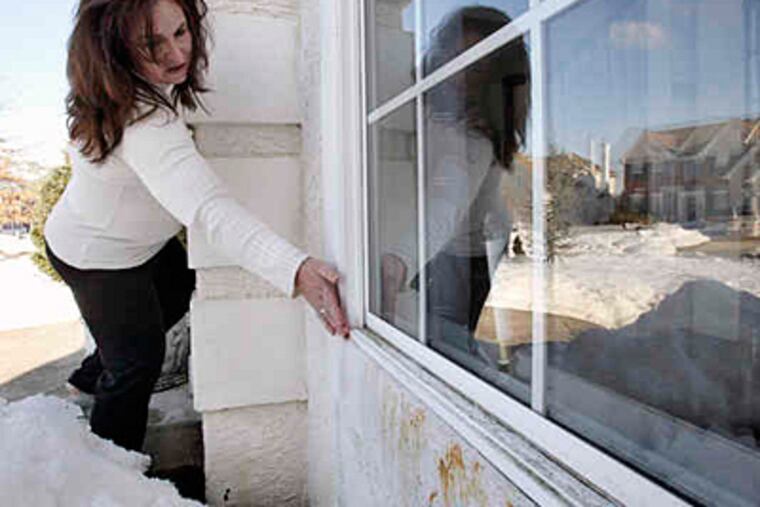Homeowners sue builder over mold
Dozens of South Jersey homeowners, claiming inferior workmanship may have triggered mold growth and created a health risk, have sued the Quaker Group, a residential and commercial developer in New Jersey and Pennsylvania.

Dozens of South Jersey homeowners, claiming inferior workmanship may have triggered mold growth and created a health risk, have sued the Quaker Group, a residential and commercial developer in New Jersey and Pennsylvania.
The homeowners, who live in upscale developments in Cherry Hill, Marlton, and Voorhees, all have the same complaint: The company failed to caulk around windows and doors and neglected to install flashing, sheet metal strips that seal the edges. Water seeped into their homes and pooled between their walls, where mold can thrive, according to two complaints filed at different times in Camden County.
Some homes also lacked insulation or tar paper behind exterior walls, the complaints say.
The complaints, filed by more than 40 homeowners, are pending in state Superior Court in Camden and follow a lawsuit that was filed by at least 20 others who bought Quaker homes in Gloucester County. Those cases have either been settled or been otherwise resolved.
The Quaker Group, based in Voorhees, also has an office in Montgomeryville, its former headquarters. The company built thousands of homes, mostly in South Jersey, over a 50-year period that ended in 2002, when it sold its residential operation to developer K. Hovnanian.
Quaker Group president Sara K. Gowing said the company was no longer involved with construction; it manages office and apartment buildings.
Nicholas Sansone, the company's lawyer, said Quaker denied the allegations. "Most of these homes are almost 10 years old (some older) and if there is proven to be water intrusion, it could have been caused or prevented by a number of factors, including homeowner maintenance," he said in an e-mail. Quaker has not been given any documents that confirm "the existence of mold" or any health problems, he added.
Lisa Ruffner, who moved into the Estates at Maison Place in Voorhees with her husband and three children in 1999, said she could not figure out why they were getting sick so often. "When it rains, we start coughing and wheezing and want to sleep a lot," she said.
Their stucco front would stay wet for 10 days, but she said she did not know that water was collecting between the walls and creating an ideal environment for mold.
A letter she sent to Quaker Group to complain about dripping windows and doors and rotting hardwood floors went unanswered, Ruffner said.
Her husband later discovered there was no insulation or moisture barrier behind the siding on their side walls.
"We were so shocked," Ruffner said.
Ruffner, a lawyer, said her two sons had been diagnosed with Epstein-Barr virus, which her doctors say may come from mold. She is having mold testing performed.
Ruffner said the family could not afford to move out of the four-bedroom Colonial, especially since her husband was recently laid off. They are hoping the lawsuit will force the builder to fix the problems.
Brad Krupnick, a Philadelphia lawyer with Josel & Feenane, represents the Ruffners and 40 other families. They live in Maison Place, the Short Hills development in Cherry Hill, or Colts Gate in Marlton.
The lawsuits say the Quaker Group and other corporate entities failed to meet "federal, state, and local building codes, laws and ordinances, and industry standards."
Many of the residents could need to have the front of their homes replaced because of the damage. Krupnick said workers would have "to rip off the front, fix whatever got wet, and put it back up."
That work could cost between $50,000 and $70,000, Krupnick estimates. The lawsuits ask for damages in excess of $50,000 per home, plus legal fees and any associated medical bills.
Krupnick, who has become a specialist in toxic-mold litigation, became involved when his own Quaker-built home in the Springdale Crossing development in Cherry Hill began leaking. He sued, and since then settled his case for an undisclosed amount, along with the cases of two neighbors.
Krupnick said that the Quaker Group told some of his clients to contact the home-warranty company.
In New Jersey, builders must provide a warranty to fix major problems that may occur in a new home within the first 10 years. But Krupnick said the warranty was limited to "major structural defects" after the third year and did not cover the moisture issues.
"The houses were defectively designed," the lawsuits state. "Unbeknownst to plaintiffs for a long period of time, [the defects] allowed water and moisture to infiltrate through the windows and into the space between the outer stucco and the walls of the house."
The homes were built between 1997 and 2002. Many have a stucco or brick front that was built by masonry subcontractor A-1 Bracket Inc., of Morrisville, the lawsuit says.
A-1 Bracket is also named as a defendant. A person who identified himself as Robert when he answered the phone at the headquarters said he was "doing the work according to industry standards 10 years ago. The industry has changed since then." He would not give his last name.